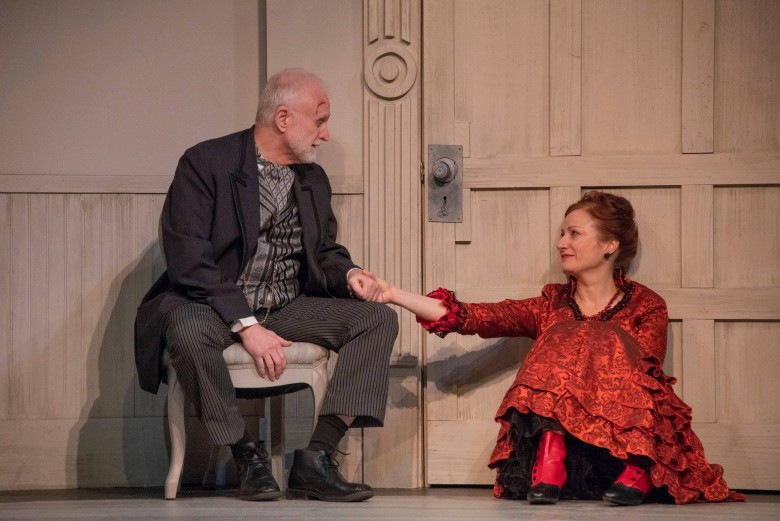Kavinoky Theatre’s second offering of the season is Obie Award-winning playwright (The Christians, Red Speedo) Lucas Hnath’s imagining of what Nora Helmer of Ibsen’s classic 1879 A Doll’s House might have done after she slammed the door on her stultifying life at the end of the play, and what would happen if she knocked on that door again fifteen years later.
In A Doll’s House, Part 2 the fictional character Nora has used a pseudonym to write a book about herself as a fictional character who struggles to find herself after slamming the door on her stifling marriage. The play is a fiction of a fiction of a fiction, which may or may not be a statement about life as we know it.
Nora has returned because her husband, Torvald, has failed to divorce her and she has been acting as a single woman, signing contracts and writing books for women. There are legal as well as social implications for this, as well as the possibility of blackmail, and she has returned to ask Torvald to file the divorce papers.
Nora arrives in bright red brocade splendor from head to toe, in stark contrast to Anne Marie, the old housekeeper dressed in black and grey who opens the door to her, and to the set by David King. It is grey, too, with an oversized Victorian door at the center of the upstage wall, a few grey chairs against the wall, a couple of covered grey hassocks strategically placed, and a small table against the wall. It looks grey and barren, like Nora’s life before she left.
Kristin Tripp Kelley as Nora and Anne Gayley as Anne Marie spar with each other in the first scene, Nora badgering Anne Marie to guess what she has been up to all these years while dying to tell her, and Anne Marie being very uncomfortable with the questioning. Both actors are very adept at the back-and-forth dialogue, interspersed with long monologues, particularly by Nora. Ms. Tripp Kelley has an elegant presence and, with a very cool demeanor at first, she becomes more animated when talking about the role of women and the possibilities for freedom in the future. Her anxiety when she imagines talking with her daughter or asking Torvald for a favor is very clear, as is the warmth she feels at times toward Anne Marie and Torvald. However, her passion always seems very much under control, when being able to be her passionate self is the very reason she left.
Anne Gayley is very good as Anne Marie, torn between her love for Nora and anger toward her, and her loyalty to Torvald and the children. She has some of the cleverest lines, as when she deadpans to Nora, “You made money writing? You must be a 'popular writer'," or in her sudden use of profanity. Ms. Gayley hobbles about, old and tired, particularly tired of being in the middle of other people’s lives, having had to abandon her own. But she shows her fire and fierceness in defending herself and her circumstances as being very different when Nora claims they are alike in being smothered by men and society.
David Oliver is very fine as Torvald. From being stunned at Nora’s appearance, to defending himself, to showing his perplexity at just what it is that Nora wants from him outside of the divorce, to breaking out of the shell he has built to protect himself, Mr. Oliver eventually shows the passion that Torvald has hidden from himself and the world for years.
Leah Berst is Emmy, the young daughter Nora is afraid to see. She is the most rigid of the characters in this play, refusing to bend, lecturing her mother, and letting her know that she has chosen the exact opposite of what Nora wants for her. Ms. Berst never lets whatever her true feelings are for her mother erupt to interfere with her determination to remain poised and in charge of the meeting, while it is clear that her feelings are just beneath her stoic presentation.
Directed by Robert Waterhouse, the play often feels detached from the audience, which gives it a certain flatness. For instance, in his choice to seat the actors against the back wall for lengthy periods of time, he creates a distance from the audience that is difficult to overcome.
A Doll’s House, Part 2 is a polemic on women’s rights and the lack thereof, a justification for an almost unheard-of-at-the-time self-indulgence, and an exploration of the very human need to be one’s own person and not be controlled by others or even by one’s own thoughts. And it is also a play in which people get together after fifteen years and blame each other for the failures in their relationships and in their lives. The questions asked about marriage, relationships, freedom, and love are left open, without answers, because there are no definitive answers, even though Nora believes that in twenty to thirty years people will have figured it all out. We wish!
At the Kavinoky Theatre through November 25.

